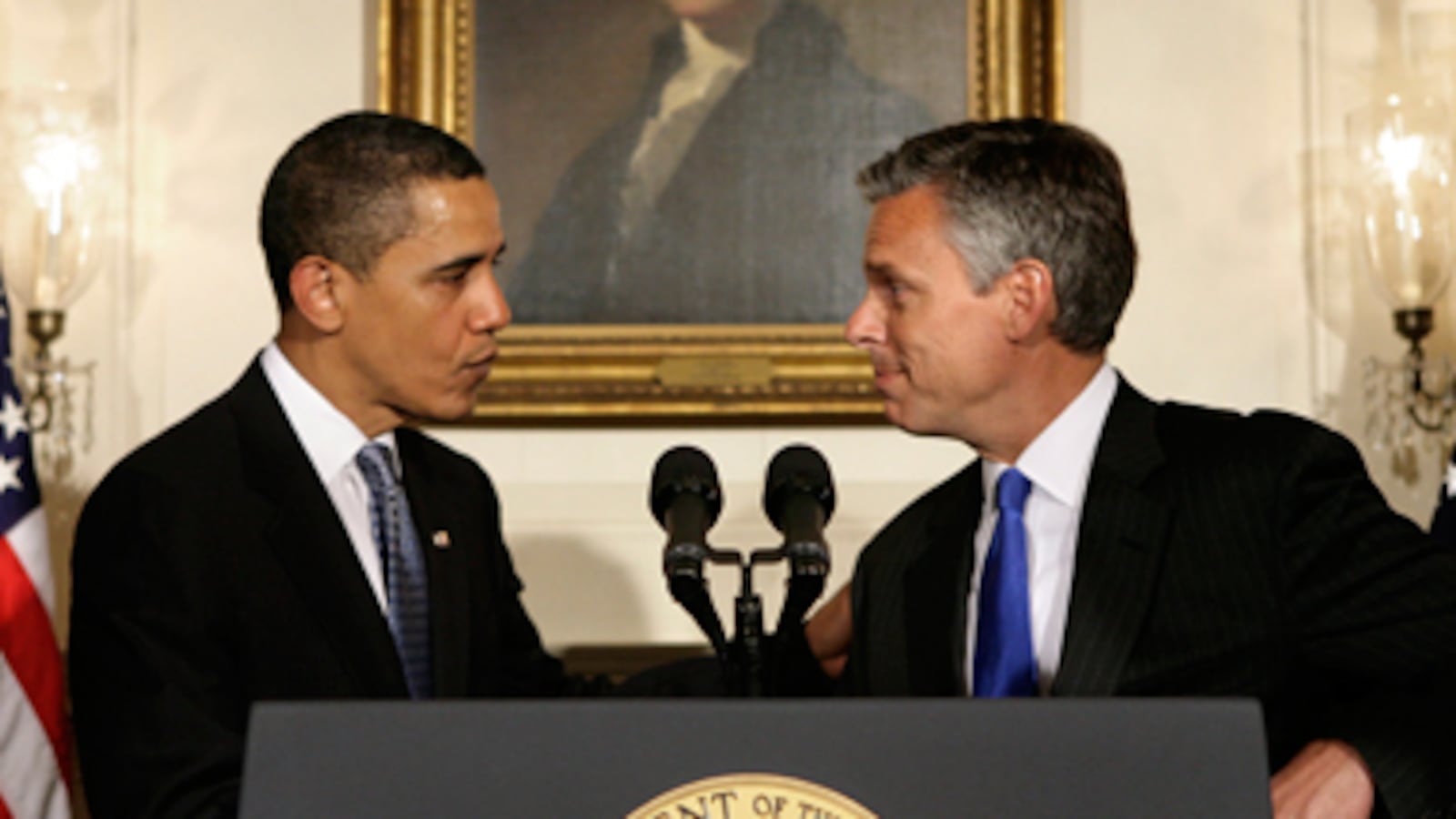What on earth is Jon Huntsman Jr. thinking?
That’s the question pundits have been trying to answer ever since the U.S. ambassador to China first hinted in a Jan. 1 Newsweek profile that he might resign his post and challenge his boss in 2012.
The naysayers’ argument is simple: He’s worked for Barack Obama, he’s moderate on key social issues (civil unions and immigration among them), and when it comes to GOP primaries, rich Mormons don’t have a very good track record. Could a smart guy like Huntsman really be so deluded that he believes the 2012 Republican nomination is within his grasp?
The answer, it appears, is yes. The White House confirmed Monday that Huntsman will be returning home in April, and insiders tell me they expect a formal campaign announcement sometime in late summer.
Political observers are, well, perplexed. Ezra Klein asks in The Washington Post, “What is being whispered in Jon Huntsman’s ear?” And Daniel Larison, writing for The American Conservative, says the news “makes no sense at all.” Even the president, asked about Huntsman’s potential candidacy during a press conference last month, poked fun at the former Utah governor’s prospects. “I’m sure that him having worked so well with me will be a great asset in any Republican primary,” Obama joked.
Issues like religion are ultimately “just campaign sideshows,” he told me. In 2012, he said, voters will choose the president they believe can turn the economy around.

I spent two hours on a Sunday morning in early December interviewing Huntsman on his political past, present, and future. Here’s what I found:
The Tea Party
Like any astute GOP candidate, Huntsman happily paid lip service to the Tea Party, calling it a “classical case of a spontaneous uprising of people who are fed up.” But one telling moment made its way through the haze of rhetoric. Attempting to draw a more candid answer from him, I challenged his assertion that populist movements like the Tea Party are “healthy” for democracy: “But don’t you run the risk of a given party not being able to nominate candidates who are willing to work with the other…”
Huntsman raised his right index finger before I could finish the question and interjected: “But that’s temporary.”
It was the only time in our interview that he interrupted me, and it was clear that he had given the subject a great deal of thought. “Our politics in America go in cycles,” he explained. “And the cycles have to complete one iteration before they give rise to an alternative. And what we’re experiencing today will give rise to an alternative. And the alternative will likely be a response to people who are perceived to have gone too far.”
Health Care
As a well-bred Mormon with ties to Utah, Huntsman has inevitably drawn comparisons to former Massachusetts Governor Mitt Romney. And though he didn’t mention Romney’s name once, it was clear that he smelled blood in the water. As governor of Utah, Huntsman spent substantial time tinkering with health-care policy, but was careful to note: “We didn’t end up going the individual-mandate route, like they did in Massachusetts.”
A subtle, wonky dig, to be sure, but one that is certain to resonate with a GOP base that overwhelmingly opposes Obama’s health-care law. Given the continued legal trouble the new law is facing—a federal judge in Florida ruled Monday that the act is unconstitutional, the second judge to reach such a finding—the issue will be front and center in the 2012 primaries.
(It is also worth mentioning that Huntsman stuck his neck out in 2008 by endorsing John McCain in the primaries instead of Romney, his fellow Mormon. That endorsement has paid off by earning Huntsman the support of John Weaver, a veteran Republican strategist who worked on McCain’s campaign before quitting.)
Mormonism
Huntsman was extremely reluctant to discuss his Mormon faith, perhaps recognizing the irreversible damage it did to Romney’s 2008 effort among conservative Christians. He took pains to prove his ecumenical credentials, as it were, by pointing to the “rich philosophical traditions” that led to his adoption of two daughters—one from India, and another from China. He also mentioned that when he was in office, “Utah’s governor’s mansion was probably the only one in the country” to celebrate the Hindu holiday of Diwali.
This hesitation aligns well with an interview he gave Fortune magazine last year, in which he said, “I can’t say I am overly religious. I get satisfaction from many different types of philosophies.”
Of course, Southern evangelicals may not be looking for a candidate with Hindu credentials, I told Huntsman. But he insisted that issues like religion are ultimately “just campaign sideshows.” In 2012, he said, voters will choose the president they believe can turn the economy around.
That Sunday morning, Huntsman stopped short of saying he was the man for the job. Maybe he knew he’d have plenty of time to make that case come summer. But given his virtually nonexistent national profile, and his ties to the White House, he faces a steep uphill battle in making that case to Republican primary voters.
What on earth is Jon Huntsman Jr. thinking?
It looks like we’ll find out soon enough.





